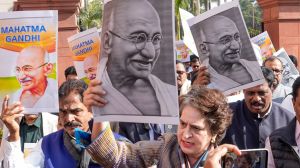Man sentenced to 3 years in jail for manhandling railway ticket collector
In such case, no lenient view is possible, considering the age of the accused and the use of muscle power,” special Judge A A Nandgaonkar said in the order passed on Friday.
 Tinku Khan was convicted under charges including 353 (use of criminal force) of the Indian Penal Code and relevant section of the Indian Railway Act. (File Photo)
Tinku Khan was convicted under charges including 353 (use of criminal force) of the Indian Penal Code and relevant section of the Indian Railway Act. (File Photo)OBSERVING THAT travelling without ticket needs to be dealt with a stern hand, a special court in a recent order sentenced a ticketless passenger to three years in jail for holding the collar of a ticket collector in 2021.
“Considering the nature of the offence wherein property of the railway has been misused without valid ticket, railway pass or a platform ticket, and when enquired by the TC, the accused not only manhandled him but even dared to use criminal force by holding his shirt collar. Thus, (the accused) deterred public servant from discharging official duty, which is required to be dealt with stern hands.
In such case, no lenient view is possible, considering the age of the accused and the use of muscle power,” special Judge A A Nandgaonkar said in the order passed on Friday.
Tinku Khan was convicted under charges including 353 (use of criminal force) of the Indian Penal Code and relevant section of the Indian Railway Act. The court also ordered Khan to pay a fine of Rs 11,000.
According to the prosecution, on February 18, 2021, Dipesh Mulave was on duty at Seawood Darave railway station in Navi Mumbai.
Around 9.30 am, he asked Khan, who was on the railway platform, to show his ticket. Khan told him that he did not have a ticket or a pass. The TC then asked for his identity card and Khan showed him an Aadhar card and an Election Id card. While one had the name Tinku, another said Rinku.
The TC asked Khan to follow him to the railway police. Prosecutor Rajlaxmi Bhandari had submitted that Khan then abused the TC and started a scuffle with him, holding his collar and threatening him. Two on-duty constables intervened and a complaint was filed against Khan.
During the trial, the TC deposed about the incident. The accused has contested that he had shown any identity cards by claiming that they are not required to be shown when asked for a ticket by ticket collectors on the suburban rail. Others who deposed included the on-duty constables.
“…quarrelling with the competent authority (TC) requires severe punishment…so that a strong message will go into public,” the court said







